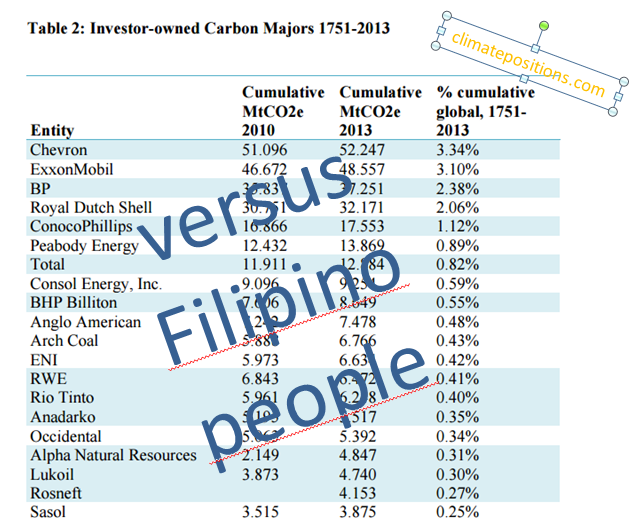Commission on Human Rights of the Philippines accuses Shell, BP, Chevron, BHP Billiton, Anglo American and 42 other carbon companies of breaching people’s fundamental rights to life, food, water, sanitation, adequate housing and self-determination

According to ‘The Guardian’ the Filipino government body ‘Commission on Human Rights of the Philippines‘ have given the world’s largest oil, coal, cement and mining companies 45 days to respond to a ‘legal complaint (pdf, 65 p)‘ that their greenhouse gas emissions have violated the human rights of millions of people living in the Philippines.
The UN Guiding Principles on Business and Human Rights explicitly call on companies to respect human rights, and there are three scenarios in which a company can be hold responsible for adverse impacts on human rights, quote: “(1) it may cause impacts through its own activities; (2) it may contribute to impacts through its own activities, either directly or through some outside entity (government, business, or other); and (3) it may be involved in impacts caused by an entity that is directly linked to its business operations, products, or services.”
The legal complaint is the first step towards an official investigation of the companies starting in October. The Commission does not have the power to force the companies to reduce greenhouse gas emissions; however, it can make recommendations to the government.
The complaint has been brought by ‘typhoon‘ survivors and 14 non-governmental organizations, and is supported by close to 32,000 Filipinos. The 47 carbon companies have been chosen on the bases of ‘research by Richard Heede (2013)‘, Climate Accountability Institute in Colorado, concluding that just 90 global companies had produced close to 65% of all anthropogenic CO2 between 1751 and 2013. Since pre-industrial times CO2 concentrations in the atmosphere have increased by 40%.
The complaint claims that the carbon companies (Carbon Majors) are “ignoring the science and the harms related to the combustion and use of the coal, oil and gas that they produce. The companies have the technical and financial capability to prevent the harm. As a means to comply with the requirements of identifying, preventing, mitigating, and accounting for adverse human rights impacts, it is important that immediate steps are taken by the companies to eliminate the risk of further human rights infringements.”
By the way, in ClimatePositions the Philippines have zero Climate Debt – read the articles ‘Climate change performance of Malaysia, Thailand, Indonesia and the Philippines‘ and ‘New at COP21: The Vulnerable Twenty Group (V20)‘. Read also the article ‘Court has ordered Netherlands to reduce carbon emissions by 25% within five years in the world’s first climate change liability lawsuit‘.
.
Additional article from The Guardien: ‘https://www.theguardian.com/sustainable-business/2016/may/07/climate-change-shell-exxon-philippines-fossil-fuel-companies-liability-extreme-weather‘ and a press release from Greenpeace International: ‘http://www.greenpeace.org/international/en/press/releases/2016/Worlds-largest-carbon-producers-ordered-to-respond-to-allegations-of-human-rights-abuses-from-climate-change/‘.
PowerPoint image by Claus Andersen, 2016 (list of carbon companies is from the legal complaint).
Comments are closed.